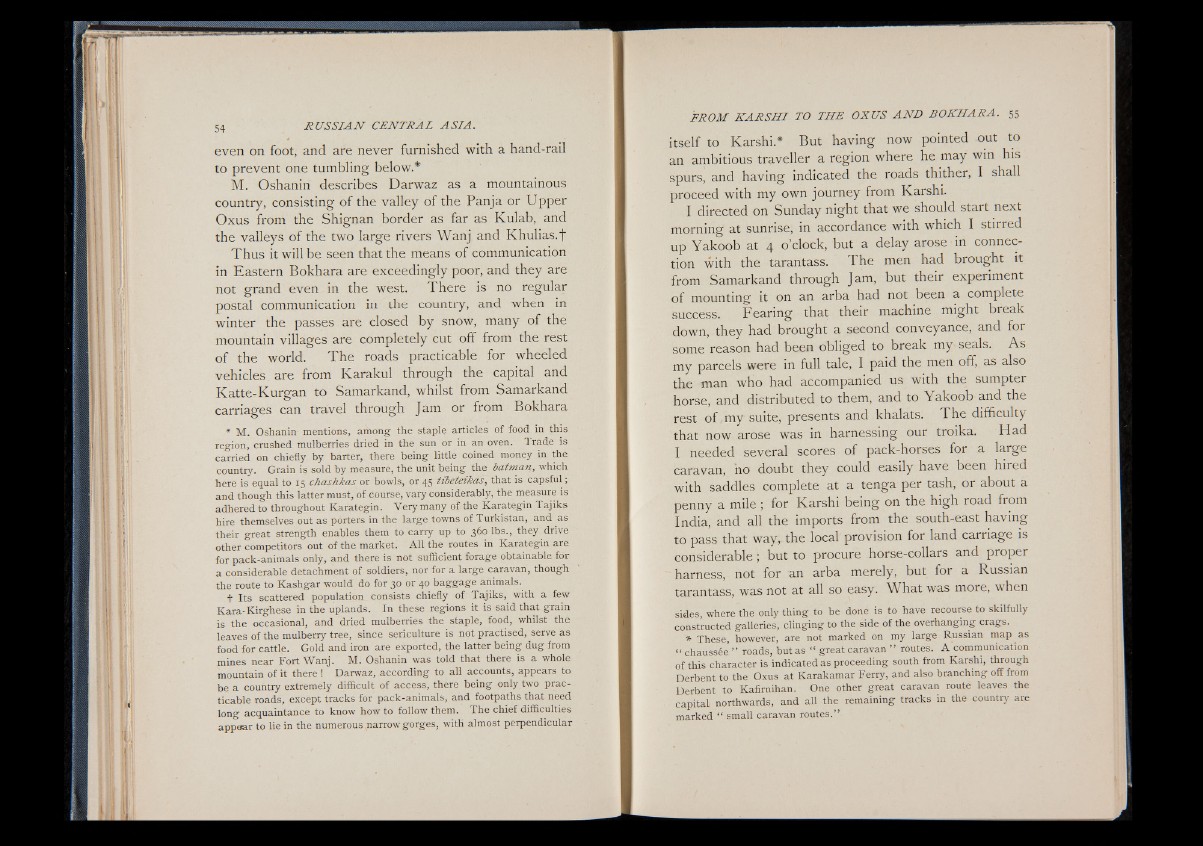
even on foot, and are never furnished with a hand-rail
to prevent one tumbling below.*
M. Oshanin describes Darwaz as a mountainous
country, consisting o f the valley of the Panja or Upper
Oxus from the Shignan border as far as Kulab, and
the valleys of the two large rivers Wanj and Khulias.t
Thus it will be seen that the means of communication
in Eastern Bokhara are exceedingly poor, and they are
not grand even in the west. There is no regular
postal communication in the country, and when in
winter the passes are closed by snow, many of the
mountain villages are completely cut off from the rest
o f the world. T he roads practicable for wheeled
vehicles are from Karakul through the capital and
Katte-Kurgan to Samarkand, whilst from Samarkand
carriages can travel through Jam or from Bokhara
* M. Oshanin mentions, among' the staple articles of food in this
region, crushed mulberries dried in the sun or in an oven, trade is
carried on chiefly by barter, there being little coined money in the
country. Grain is sold by measure, the unit being the batman, which
here is equal to 1 5 chashkas or bowls, or 45 tzbcteikas, that is capsful,
and though this latter must, of Course, vary considerably, the measure is
adhered to throughout Karategin. Very many of the Karategin Tajiks
hire themselves out as porters in the large towns of Turkistan, and as
their great strength enables them to carry up to 360 lbs., they drive
other competitors out of the market. All the routes in Karategin are
for pack-animals only, and there is not sufficient forage obtainable for
a considerable detachment of soldiers, nor for a large caravan, though
the route to Kashgar would do for 30 or 40 baggage animals.
f Its scattered population consists chiefly of Tajiks, with a few
Kara-Kirghese in the uplands. In these regions it is said that grain
is the occasional, and dried mulberries the staple, food, whilst the
leaves of the mulberry tree, since sericulture is not practised, serve as
food for cattle. Gold and iron are exported, the latter being dug from
mines near Fort Wanj. M. Oshanin was told that there is a whole
mountain of it there ! Darwaz, according to all accounts, appears to
be a country extremely difficult of access, there being only two practicable
roads, except tracks for pack-animals, and footpaths that need
long acquaintance to know how to follow them. The chief difficulties
appaar to lie in the numerous .narrow gorges, with almost perpendicular
itself to Karshi.* But having now pointed out to
an ambitious traveller a region where he may win his
spurs, and having indicated the roads thither, I shall
proceed with my own journey from Karshi.
I directed on Sunday night that we should start next
morning at sunrise, in accordance with which I stirred
up Yakoob at 4 o’clock, but a delay arose in connection
with the tarantass. T h e men had brought it
from Samarkand through Jam, but their experiment
o f mounting it on an arba had not been a complete
success. Fearing that their machine might break
down, they had brought a second conveyance, and for
some reason had been obliged to break my seals. As
my parcels were in full tale, I paid the men off, as also
the man who had accompanied us with the sumpter
horse, and distributed to them, and to Yakoob and the
rest of my suite, presents and khalats. T h e difficulty
that now arose was in harnessing our troika. Had
I needed several scores of pack-horses for a large
caravan, no doubt they could easily have been hired
with saddles complete at a tenga per tash, or about a
penny a mile ; for Karshi being on the high road from
India, and all the imports from the south-east having
to pass that way, the local provision for land carriage is
considerable ; but to procure horse-collars and proper
harness, not for an arba merely, but for a Russian
tarantass, was not at all so easy. What was more, when
sides, where the only thing to be done is to have recourse to skilfully
constructed galleries, clinging to the side of the overhanging crags.
* These, however, are not marked on my large Russian map as
“ chaussée ” roads, butas “ great caravan ” routes. A communication
of this character is indicated as proceeding south from Karshi, through
Derbent to the Oxus at Karakamar Ferry, and also branching off from
Derbent to Kafirnihan. One other great caravan route leaves the
capital northwards, and all the remaining tracks in the country are
marked “ small caravan routes.”